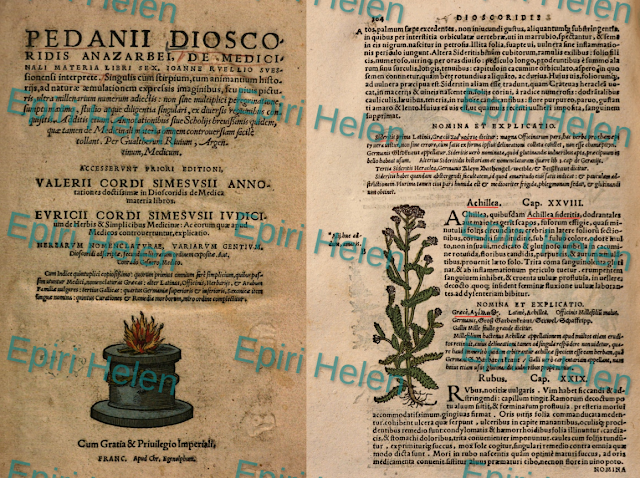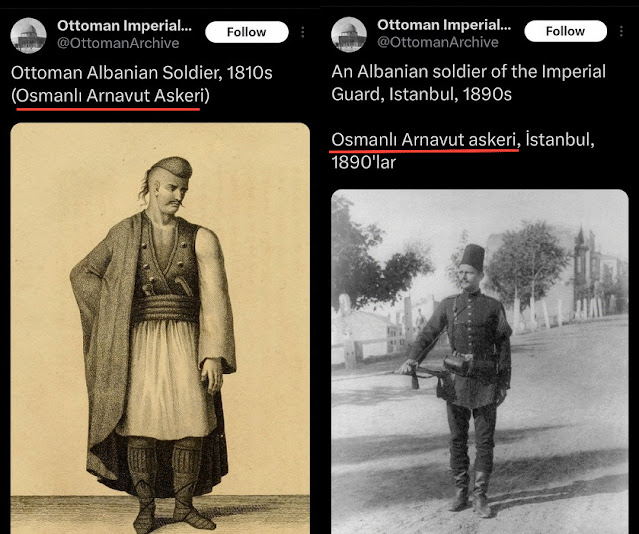Greek Mountain Tea, Achilleos Plant - Cajit Malit Grek ose Bima e Akilit
The Mountain Tea or Tsait tou Vounou original name is Sideritis. The name comes from Σίδηρος which means Iron in the Greek language.
According to Pliny, who describes the "magnet" it was called by the Greeks Sideritis, from its power of attracting iron, σίδηρος; the name "magnet" according to Nicander, was derived from a shepherd called Magnes, who accidentally discovered it by feeling the iron nails in his boots stick to the stones on which he was walking.
Sipas Plinit, Sideritis kishte fuqi për të tërhequr hekurin. Ai kish dhe emrin "magnet" sipas Nicander (mjek I lashte Grek) ky emer, "magnet" rrjedh nga një bari me emrin Magnes, i cili e zbuloi aksidentalisht këtë bime duke ndjerë se gozhdët e hekurt në çizmet e tij ngjiteshin me gurët mbi të cilët po ecte.
Then he explains the name of Sideritis as Parthenium: a slave of Pericles, while working on a temple in the citadel, fell from the roof and was healed by Sideritis, later named "parthenium" and dedicated to Minerva, after the plant's virtues were revealed to Pericles in a dream by Minerva which is Venus.
Pliny e quajti Sideritin dhe "Parthenium" qe do te thote Minerva ose Venus. MINERVA quhej dhe Virgjereshe Parthenos.
Ai shpjegon pse ja vuri Sideritis emrin Parthenium: Nje skllav i Perikliut, ndërsa punonte në një tempull në kështjellë, ra nga çatia dhe u shërua nga Sideriti.Ai me më vonë e quajti "parthenium" dhe ja kushtoi Minervës/Venus, pasi virtytet e bimës ja zbuloi Perikliut në ëndërr vete Minerva që është Venusi.
Ai thotë se lëngu i Sideritis kur është i ngrohtë është i mirë për abseset e qelbëzuara; dhe për kurimin e konvulsioneve, këputjeve, nxirjeve dhe efekteve të rënies nga lartësite...
Pliny: "Achilles too, the pupil of Chiron, discovered a plant which heals wounds, and which, as being his discovery, is known as the "achilleos" It was by the aid of this plant, they say, that he cured Telephus...By some persons this plant is called "panaces heracleon," by others, “sideritis. Other authorities, however, while admitting that this last plant is good for wounds..."
In Greek mythology, Chiron was a wise and benevolent centaur, renowned as a teacher and healer, who instructed heroes like Achilles, Jason, and Asclepius.
Pliny na thote qe Sideritis kish nje emer tjeter "Achilleos". Këtë emer mori nga Akili student I Chiron (ne mitologjinë Greke, Chiron ishte një centaur i mençur dhe dashamirës, i njohur si mësues dhe shërues, i cili udhëzoi heronj si Akili, Jasoni dhe Asklepi i cili e zbuloi këtë bime qe sheron plaget dhe me ndihmen e kesaj bime ai sheroi djalin e Herkulit... Nga kjo bime mori emrin Achillea Sideritis.
Pliny also notices that Sideritis "reduces varicose veins and does its work without pain".
Plini gjithashtu vëren se Sideritis "zvogëlon venat varikoze dhe e bën punën e tij pa dhimbje".
Pedanius Dioscorides, "the father of pharmacognosy", was a Greek physician, pharmacologist, botanist, and author of De Materia Medica, a 5-volume Greek encyclopedic pharmacopeia on herbal medicine and related medicinal substances, that was widely read for more than 1,500 years. Even he calls Sideritis Achillea Sideritis
Pedanius Dioscorides, "babai i farmakognozës", ishte një mjek, farmakolog, botanist Grek dhe autor i De Materia Medica, një farmakopeia enciklopedike Greke me 5 vëllime mbi mjekësinë bimore dhe substancat medicinale të lidhura me to, që lexohej gjerësisht për më shumë se 1500 vjet. Edhe ai e quan Sideritis Achillea Sideritis.








